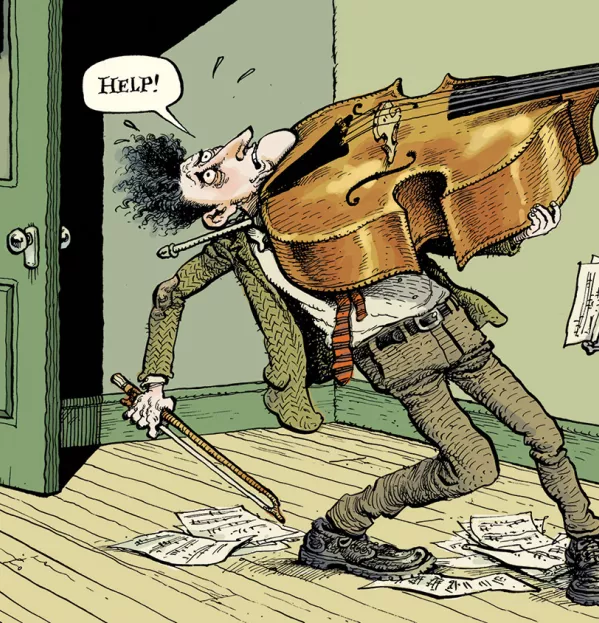If you can’t play the part, expect some bum notes

A few years ago, following intense peer pressure, I took part in a National Orchestra for All fundraiser. The challenge was simple: to learn to play the Alton Towers theme tune on a violin, from scratch, within three months. I then had to perform the piece (turns out it’s called In the Hall of the Mountain King) on stage as part of a full orchestra.
I have never played an instrument, can’t read music and was left to figure out how to play the instrument by myself. My progress was snail-like. I needed help. Alice, an expert music teacher, rescued me. She taught me exactly how to play the notes and showed me how to practise. In short, she saved the day and landed us a standing ovation.
Teachers such as Alice, who turn novices like me into experts, are being helped by researchers such as Anders Ericsson and his “science of expertise”. But it’s not just teachers who can learn from this research - there are lots of lessons for policymakers, too.
Experts, unlike novices, have domain-specific mental models stored in their long-term memory. Simply put, they have lots of knowledge on a particular topic organised in a way that helps them to use it. These mental models allow experts to plan, see patterns and predict what might happen next. They also help new knowledge to be remembered more easily.
Alice, my music teacher, has rapid access to lots of organised music-teaching knowledge, which allowed her to swiftly and effectively stop me from making such a dreadful noise. It’s Alice’s mental models that distinguish her as an expert music teacher. Like other experts, she appears to see problems and feel her way through solutions with ease.
Building mental models
The argument against pure discovery learning for pupils draws on this science of expertise. When pupils are novices (which most are), discovery learning is generally less effective than guided learning. If we want pupils to be creative problem-solvers, we have to start with a strong and sustained dose of guided learning to build their mental models and speed up their memorisation of new knowledge. Only then is discovery learning more effective as, over time, pupils build the mental models needed to guide their own learning. My violin and I were never going to make it alone.
The move towards guided learning is becoming increasingly popular. But if its advocates are right, then there’s an important contradiction in our system that needs addressing: as teachers move ahead, teacher educators and policymakers are being left behind.
Despite there being more guided learning for pupils, we continue to give scant guided learning to teachers and heads, instead favouring autonomy. This needs a rethink. Our approach to instruction shouldn’t be driven by whether you’re a pupil or a school leader, nor should it be driven by whether you’re aged 5 or 55.
If we’re right about expertise, professional development should be driven by whether you’re an expert in the field you’re working in. If we accept that guided learning is the best way to teach novices, then the principle holds for all novices - anyone who is new to problem-solving within a particular domain.
Novice teachers usually get heavy doses of trial and error, or discussions with fellow novices. They ask to be told what to do, only to be handed more autonomy than they can handle. We’re too quick to assume, for example, that their ‘geographer’ mental models from university can be reorganised into ‘geography teacher’ mental models, without extensive instruction from an expert teacher educator.
Experience required
Similarly, in too many cases, free schools are opened by novice headteachers who have few ‘headteacher’ mental models to draw upon as they walk the corridors. Everything is new, and they can’t master and organise the information fast enough to problem-solve at the rate required. Their experience in other fields is not as relevant as they had hoped and the job becomes overwhelming.
Two things need to happen, the first of which is within our control. We need to be more confident about calling out when we’re a novice. This should be a hallmark of what teacher professionalism means. Becoming a head of year, teaching a second subject or switching from Year 6 to Year 1 moves you into a new domain. Each move requires us to reorganise our mental models around the new problems we’ll face each day. Guided learning is the best way to get us there.
The second is to demand more high-quality development. Teachers deserve at least as much effort to go into their training as they put into their teaching. That means proper curriculum design and excellent instruction sustained over time. Too often we’re told to “discuss it on our tables” in our one-off twilight sessions because the facilitator is either worried about our “professional identity” or doesn’t have the expertise they need to teach teachers. Neither is helpful.
At the Institute for Teaching, we believe teachers deserve better and we are dedicated to providing it. As for my violin playing? I’m hoping to add to those mental models soon.
Matt Hood is director of the Institute for Teaching
You need a Tes subscription to read this article
Subscribe now to read this article and get other subscriber-only content:
- Unlimited access to all Tes magazine content
- Exclusive subscriber-only stories
- Award-winning email newsletters
Already a subscriber? Log in
You need a subscription to read this article
Subscribe now to read this article and get other subscriber-only content, including:
- Unlimited access to all Tes magazine content
- Exclusive subscriber-only stories
- Award-winning email newsletters